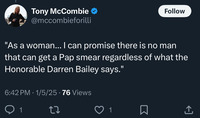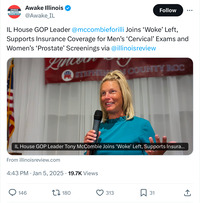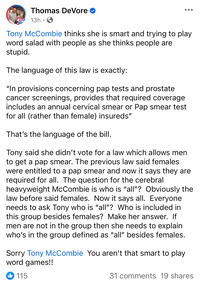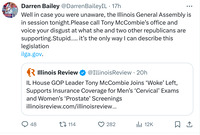|
Some afternoon updates: Karina’s Law; Hemp; Energy; PRB/IDOC (Updated)
Monday, Jan 6, 2025 - Posted by Rich Miller * I decided to switch this post to a liveblog format. It takes a second to load, so be patient…
|
|
Isabel’s afternoon roundup
Monday, Jan 6, 2025 - Posted by Isabel Miller * Tribune…
* WSIL…
Click here for the Ameren outage map. * Press release | December Illinois Flash Index increased after declining in November: The Illinois Flash Index for December showed strength, rising to 102.4 from its reading last month of 102. […] Illinois’ major state tax revenues, the primary drivers of the index, were strong in December. Both sales and individual income tax receipts were up in real terms from the same month last year while corporate receipts were down slightly. Nominal sales tax receipts recorded the highest monthly total in history, missing the one-billion-dollar level. * Crain’s | Illinois AG starts crackdown on weight-loss drug copycats: Illinois Attorney General Kwame Raoul is cracking down on potentially unsafe copycats of popular weight-loss drugs, like Ozempic or Zepbound, issuing cease and desist letters to local medical spas marketing such medications and warning the public about their practices. Raoul’s office recently sent cease and desist letters to five unnamed medical spas in the Chicago area that were allegedly producing misleading marketing content for glucagon-like peptide 1, or GLP-1, drugs, which treat obesity, Type 2 diabetes and heart disease. * Press Release | Collins pushes for expanded protections for nursing home residents: Under the legislation, House Bill 2474, nursing homes would be prohibited from retaliating against a resident who is exercising their rights. If a resident faces retaliation, they would be able to file a civil suit against the nursing home and potentially recover damages if proven true. […] House Bill 2474 passed the Senate on Sunday. * Herald-Review | Decatur in line for horse racing track, casino under proposed legislation: The legislation, which has yet to be filed, would specifically authorize an organization license for harness racing in Macon County. Though the license would technically be open to any group that applies for it, the legislation is aimed at opening the door for Virginia-based Revolutionary Racing to develop a more than 200-acre parcel of vacant land at the northwest corner of U.S. 36 and Wyckles Road into a harness race track. * What I’m Reading | These programs help Black students graduate. A federal complaint claims they’re discriminatory.: The Black Male Initiative, along with the Black Student Achievement Program (BSAP), are now targets of a federal civil rights complaint filed by the Equal Protection Project, a conservative legal group. The complaint alleges that the two programs, run by NIU’s Center for Black Studies, unlawfully discriminate based on race and sex in violation of the Constitution. * RiverBender | Illinois DCFS Offers Post-Secondary Scholarships to Current and Former Youth in Care: Through the program, a minimum of 53 academic scholarships will be awarded to current and former youth in care for the upcoming school year, with four awards reserved for the children of veterans and two awards presented to students pursuing degrees in social work in honor of Pamela Knight and Deidre Silas, two DCFS caseworkers who succumbed to injuries sustained in the line of duty. * ABC Chicago | Jury back in court after extended holiday break in former IL House Speaker Michael Madigan trial: The jury Monday got to hear prosecutors cross-examine the former Illinois speaker’s then-chief legal counsel: now appellate court Justice David Ellis. Ellis is one of the witnesses called by Madigan’s defense team, as they try to refute the government’s claims that Madigan ran a decade-long criminal enterprise designed to enrich himself and his political cronies. * ABC Chicago | Chicago Transit Authority deactivates X social media accounts: The agency confirmed to ABC7 Friday that two of their accounts are no longer active on the site formerly known as Twitter. The CTA and CTA service alerts X accounts now have disclaimers saying they are no longer active.
* WBEZ | CPS CEO says contract talks with the teachers union have not stalled: ‘In fact, it’s just the opposite’: Chicago schools chief Pedro Martinez pushed back Friday against the teachers union’s claim that contract negotiations have stalled in the two weeks since he was fired. “The urgency has never been higher,” Martinez said, who, due to a provision in his contract, will stay at the helm of the school district for six months. “There is no evidence at all (that progress has stalled). In fact, it’s just the opposite.” * Tribune | CTA to lock in federal funding for Red Line extension before Trump takes office: The CTA is set to formally lock in needed federal money for the extension of the Red Line before President-elect Donald Trump takes office, paving the way for the long-planned addition through Chicago’s Far South Side to move forward. A large, nearly $2 billion federal grant, key to moving the $5.3 billion project forward, had been promised to the CTA but the formal agreement not yet signed. That put the transit agency under pressure to finalize the agreement before the change in administration and a Republican-controlled Congress could potentially throw the commitment into jeopardy. * Tribune | Chicago, once again, ranks among the worst in the nation for traffic congestion in annual report: Roads are so snarled that the city once again ranked among the worst in the nation for the severity of traffic in 2024. Drivers lost an average of 102 hours to traffic last year, putting the Chicago metro area on par with New York City — and for Chicago, 2024 traffic was even worse than the 96 hours the average driver lost to traffic the year before, according to a new report from mobility analytics firm Inrix. * ABC Chicago | Thornton Township stops bus service for senior citizens amid government shutdown: The government there remains shut down over disagreements between Supervisor Tiffany Henyard and two township trustees. Residents who rely on the bus service feel stuck in the middle. “It’s a hardship on seniors, they rely on this service,” said resident Tya Robinson. * Daily Herald | Glendale Heights village president asks court to put him back on ballot: Khokhar filed a petition Monday seeking judicial review of the village electoral board’s Dec. 23 decision to remove him from the ballot and keep him from seeking a second term. Listed as defendants are objector Matthew Corbin and the three members of the board — village trustees Chester Pojack and Mary Schroeder, and Village Clerk Marie Schmidt. * Naperville Sun | Former Naperville Councilman Kevin Coyne named new DuPage County GOP chair: Former Naperville City Councilman Kevin Coyne is taking over as chairman of the DuPage County Republicans. He succeeds Jim Zay, a longtime DuPage County Board member. Coyne officially took the reins New Year’s Day. The change of guard comes in the wake of a strong showing by Democrats across DuPage County in November, the latest of what’s been a string of successes for local Democrats in recent years. * Daily Southtown | Judge restores opposition slate in Tinley Park after ‘clearly erroneous’ Electoral Board ruling: The objection claimed the nominating petitions were invalid because they included an array of six small U.S. flags on the top of each page. A three-person village Electoral Board ruled in favor of the objectors Dec. 9, removing a slate led by Michael Maloney in opposition to Mayor Michael Glotz from the ballot. Village Trustee William Brennan chaired the panel, which included board members Mathias Delort and Paul Karkula. Delort voted against removing the candidates from the ballot. * SJ-R | City of Springfield unveils first proposed budget for FY26. What you need to know: The public is getting a first look at the city of Springfield budget while departments will lay out particular programs in workshops beginning Jan. 14. The overall ask is $350,232,993 by agencies outside of City, Water, Light & Power. The utility is seeking $318,611,749. In both cases, that excludes American Rescue Plan Act, or ARPA, expenses.
|
|
Bill to rein in health insurance companies falsely mocked by far right
Monday, Jan 6, 2025 - Posted by Rich Miller * A very simple and straightforward explanation of House Bill 2350 from then-Sen. Cristina Pacione-Zayas…
* As we are all too painfully aware, health insurance companies are notorious for often using whatever methods they can to deny coverage. So, when state statute requires that insurance companies cover the full costs of annual prostate cancer screenings for men above a certain age, and you’ve changed your birth certificate to reflect that you are a female, your exam may no longer be covered, even though you still need those annual prostate screenings. Same goes for mandated coverage for annual cervical smear or Pap smear tests. If you’ve changed your birth certificate to male, you very well might not get covered. That’s it. The bill would simply protect a relatively small handful of Illinoisans from being denied health insurance coverage for a couple of basic procedures. The bill passed the House way back in March, then cleared the Senate in May and was signed into law a month later. * But the far right just took notice…
🤦 * The usual suspects were fully triggered… * McCombie felt the need to defend herself… 
|
|
Mayor criticized by governor’s office for ‘debating imaginary revenue strategies at the expense of children’s health’ (Updated)
Monday, Jan 6, 2025 - Posted by Rich Miller * Politico…
The mayor’s office is pretty clueless when it comes to state stuff, and this is no exception. 1) The bill has been bouncing around for a long time in various forms. The current version passed the Senate in late May - 225 days ago. The time to be “at the table” was before then, or at least soon after. 2) From the governor’s office…
* Also from the governor’s office…
…Adding… The mayor’s office is in town today. Pic from Isabel of Kennedy Bartley…  I’m told the bill as of this morning had 62 House Democratic votes.
|
|
Showcasing The Retailers Who Make Illinois Work
Monday, Jan 6, 2025 - Posted by Advertising Department [The following is a paid advertisement.] Retail provides one out of every five Illinois jobs, generates the second largest amount of tax revenue for the state, and is the largest source of revenue for local governments. But retail is also so much more, with retailers serving as the trusted contributors to life’s moments, big and small. We Are Retail and IRMA are dedicated to sharing the stories of retailers like Ade, who serve their communities with dedication and pride.
|
|
The Illinois Flag Commission’s reject pile
Monday, Jan 6, 2025 - Posted by Isabel Miller * Winter break had just started when my FOIA for the Illinois Flag Commission submissions came through. The rejects did not disappoint—here is a small sample…
* I think this would be a perfect I voted sticker… 
* Come on people…
Click here to check out all the submissions. There are definitely some hidden gems—let me know which ones are your favorites! If you need a refresh of the commission’s selection you can find that here.
|
|
Happy birthday, Isabel!
Monday, Jan 6, 2025 - Posted by Rich Miller * Here’s a pic of Isabel with the legendary Tawl Paul…  * And here’s one of Isabel with some guy with big ears…  * One more…  If you see that young lady at the Statehouse today, please wish her a happy birthday.
|
|
Stratton testing the waters
Monday, Jan 6, 2025 - Posted by Rich Miller * My weekly syndicated newspaper column which ran before the Christmas holiday break…
Discuss.
|
|
Open thread
Monday, Jan 6, 2025 - Posted by Isabel Miller * What’s going on in your part of Illinois?…
|
|
Isabel’s morning briefing
Monday, Jan 6, 2025 - Posted by Isabel Miller * ICYMI: Illinois lawmakers consider an array of measures in final days of lame-duck session. The Tribune…
- The Senate passed a bill Sunday intended to protect senior citizens in Illinois from abuse and neglect by prohibiting nursing homes from retaliating against a resident for registering complaints about the home to state officials. - Also under consideration is a bill that would require the Illinois Department of Corrections to post quarterly reports on the use of restrictive housing, or solitary confinement, on the agency’s website. * Related stories…
∙ WAND: Illinois House GOP aggravated with inaction during Sunday lame duck session ∙ WAND: Hemp regulation top priority for Illinois lawmakers during lame duck session * Daily Herald | What will happen in the air, on roads and with public transit in 2025?: “Last year, I cynically predicted that the taxpayers would ultimately be hit hard with little in the way of reform to address the financial problems at CTA, Metra and Pace,” said Northwestern University Professor Savage. “My prediction has not changed.” He said to expect legislative activity and intense politicking in the first half of the year over the Metropolitan Mobility Authority or alternative legislation. * Tribune | After long holiday break, jury in Madigan corruption trial back for more defense testimony: After an extended 18-day holiday break from testimony, the jury in the corruption trial of former House Speaker Michael Madigan will be back to work Monday to hear more defense witnesses in a case inching to the finish line. Before the panel was sent home for the holidays on Dec. 19, the trial’s spotlight had finally turned to Madigan’s defense team, whose witnesses so far have offered a far different picture of the powerful Democratic speaker than the image of a conniving and opportunistic political machine boss painted by prosecutors. * AgriNews | Eliot Clay to lead AISWCD: The Association of Illinois Soil and Water Conservation Districts announced the selection of Eliot Clay as its new executive director. Clay comes to the AISWCD from the Illinois Environmental Council, where he led their policy agenda on agriculture, conservation and how natural and working lands are utilized in Illinois. * Labor Tribune | Illinois unions calling Jan. 6 Day of Action to fix Tier 2 pensions: On Monday, Jan. 6, the Illinois Education Association, Illinois AFL-CIO and others are pushing for a one-day lobbying session, setting up a number for constituents and Labor activists to call their legislators and ask them to fix the Tier 2 problem. In 2010, the Illinois state legislature and then-Gov. Pat Quinn approved a law in the middle of the recession that forced state leaders to deal with decades of underfunding by changing the way state retirement benefits and calculated. It only affected employees who began their jobs after Jan. 1, 2011 – known as the Tier 2 employees. * Tribune | Statewide police body camera requirement kicked in Jan. 1, but full compliance picture unclear: The most recent report from the Illinois Law Enforcement Training and Standards Board is from 2023, before many small departments were required to comply, and falls short of giving a full picture. Only about 180 departments provided information about body cameras to the ILETSB. Of the roughly 170 departments from that group which reported using cameras in 2023, 20 didn’t explain their review process for camera footage and 15 failed to report how many cameras they had on hand, according to the 2023 report. Another 25 were missing the numbers of officers in the department using body-worn cameras. All three elements are required to be reported under the law. * Tribune | Chicago leaders prepare for ‘TIF cliff’ as several city special taxing districts expire: It’s the latest chapter in Chicago’s long history with TIFs, which supporters have praised for spurring growth in struggling neighborhoods and critics have hammered as little more than opaque slush funds for aldermanic and mayoral pet projects. Council members quietly got the ball rolling weeks ago during the chaos of passing this year’s city budget. They let 13 TIF districts expire and extended eight others for another 12 years. * Sun-Times | Chicago’s homelessness surged in 2024, as major U.S. cities bore the brunt of a national trend: Nationally, the dramatic rise was driven mostly by a lack of affordable housing, natural disasters and a surge of migrants in several parts of the country, federal officials say in a new report. Chicago estimated 18,836 people experienced homelessness last year compared with 6,139 in 2023, according to the city’s annual tally released last summer. * WBEZ | Chicago students without bus service getting PiggyBack rides to school: Reliance on school buses has waned for years as districts struggle to find drivers and more students attend schools far outside their neighborhoods. As responsibility for transportation shifts to families, the question of how to replace the traditional yellow bus has become an urgent problem for some, and a spark for innovation. State and local governments decide how widely to offer school bus service. Lately, more have cut back. Only about 28% of U.S. students take a school bus, according to a Federal Highway Administration survey concluded early last year. That’s down from about 36% of students in 2017. * Sun-Times | The Bears get a big victory over the Packers. A bigger victory: This miserable season is thankfully over: Cairo Santos didn’t have a game-winning field-goal attempt blocked, the way he did on the final play of a 20-19 loss to the Packers on Nov. 17. The Bears didn’t find a strange way to lose a strange game, the way they did so many times in this dreadful season. The game didn’t end with the Bears trying to explain their inherent Bear-ness, as it so often did in 2024. * Tribune | Lake-effect snow in Illinois likely to disrupt Monday commute as winter blast hits hardest farther south: According to the National Weather Service, travel will be affected the most in northeastern Illinois as snow blows in Sunday night through noon Monday. Accumulations might reach 3 to 5 inches across portions of Lake County — perhaps even higher near the Wisconsin state line. As the snow band moves south toward Chicago from noon to 6 p.m., it could drop 1 to 3 inches. * Daily Herald | Sales tax switch creates funding shortfall for mental health services in McHenry County: For some clients of the Association for Individual Development, having access to the nonprofit’s help can have life-or-death stakes. […] According to county records, the organization received about $100,000 less this year in funding from the McHenry County Mental Health Board, down from $345,725 to $245,000. Those funds help cover things like psychiatric services and a certified recovery support therapist. Baker attributes the drop to the county’s new quarter-cent sales tax for the mental health board generating less revenue than projected — the result of what McHenry County officials acknowledge was an error on their part. * Highland Park Mayor Nancy Rotering | Act now, Illinois lawmakers, to keep intoxicating hemp products out of kids’ reach: Gov. JB Pritzker and leaders in the Illinois General Assembly have announced their support for House Bill 4293, a bill regulating the sale of intoxicating hemp products across the state. I have fought to keep the Highland Park community, particularly our children, safe from unregulated and deceptively advertised products. But this is a fight no single town, village or city can win on their own. * Shaw Local | Solar development, data center proposed for 30 acres along Peace Road in DeKalb: A developer wants city permission to install a solar field and data center on about 30 acres of land west of Peace Road in DeKalb, documents show. Donato Solar has submitted a concept plan for a 4-megawatt solar energy system and what the company is calling a “boutique data center” to sit at 1199 N. Peace Road, between Greenwood Acres and Challenger drives, according to an agenda released ahead of Monday’s Planning and Zoning Commission meeting. * SJ-R | Author and historian Michael Burlingame to address Abraham Lincoln Banquet: Renowned Abraham Lincoln scholar, author and professor Michael Burlingame will be the featured speaker at the Abraham Lincoln Association (ALA) Birthday Banquet at the President Abraham Lincoln Hotel on Feb. 15. The free Benjamin P. Thomas Symposium will be held the same day. The author of the two-volume “Abraham Lincoln: A Life,” one of the most definitive biographies of the 16th president, Burlingame is the Chancellor Naomi B. Lynn Distinguished Chair in Lincoln Studies at the University of Illinois Springfield. * 25News Now | Illinois State Police activate emergency snow plan for many counties south of Peoria: The affected counties include Sangamon and Logan. Other Troop 6 counties are Adams, Brown, Cass, Christian, Mason, Menard, Morgan, Pike, Schuyler, and Scott. Troopers in Troop 6 patrol I-55, I-72, I-155, I-172, as well as all the state and U.S. highways within the 12 counties. Motorists are urged not to travel unless it is absolutely necessary. * NBC Chicago | Multi-vehicle crash closes Interstate 70 in Illinois as winter storm continues: All traffic was being diverted off the roadway at U.S. Route 40, ISP officials said in a social media post at around 3:03 p.m. There were no immediate reports of injuries in the crash. * WCIA | Champaign Public Works working 24-hour day clearing roads: The City’s Public Works Department started the process back in October checking plows and going over routes for snow removal. Public Information Officer Kris Koester said staff have been working back-to-back 12-hour shifts to clear roadways. […] “As the forecast changes, or as the forecast moves along, the weather moves along, we’ll continue to update our resources to be out on the streets making sure the roads are as passable as possible while it’s snowing,” Koester said. * AP | Higher Social Security payments coming for millions of people in public service jobs from bill that Biden signed: President Joe Biden on Sunday signed into law a measure that boosts Social Security payments for current and former public employees, affecting nearly 3 million people who receive pensions from their time as teachers, firefighters, police officers and in other public service jobs. Advocates say the Social Security Fairness Act rights a decades-old disparity, though it will also put strain on Social Security Trust Funds, which face a looming insolvency crisis.
|
|
Protected: SUBSCRIBERS ONLY - Today’s edition of Capitol Fax (use all CAPS in password)
Monday, Jan 6, 2025 - Posted by Rich Miller
|
|
Live coverage
Monday, Jan 6, 2025 - Posted by Isabel Miller You can click here and here to follow the Madigan trial. Click here and/or here to follow breaking news. Hopefully, enough reporters and news outlets migrate to BlueSky so we can hopefully resume live-posting.
|
|
Selected press releases (Live updates)
Monday, Jan 6, 2025 - Posted by Isabel Miller
|
| « NEWER POSTS | PREVIOUS POSTS » |




























